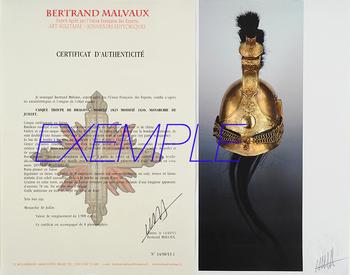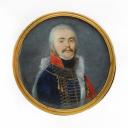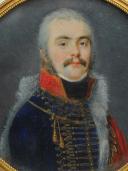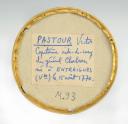
VICTOR PASTOUR CAPTAIN AIDE-DE-CAMP TO GENERAL JOSEPH CHABRAN, Directory-Consulate, circa 1798-1800: miniature portrait. 26505
Sold out
VICTOR PASTOUR CAPTAIN AIDE-DE-CAMP TO GENERAL JOSEPH CHABRAN, Directory-Consulate, circa 1798-1800: miniature portrait. 26505
Round miniature D 6.5 cm (at sight).
Watercolor and gouache.
Bust portrait in hussar outfit, scarlet cloth pelisse with gray fur trim. Dolman in dark blue cloth with golden braids and braids, scarlet collar.
Presented in a brass rod frame D 7.5 cm, under bedside glass.
France.
Consulate.
Very good state.
BIOGRAPHY: Jean Baptiste Victor PASTOUR.
Born August 15, 1770 in Entraigues-sur-la-Sorgue, Vaucluse, Provence-Alpes-Côte d'Azur.
Died on April 22, 1834 in Saint-Andiol, Bouche0s-du-Rhône, Provence-Alpes-Côte d'Azur, at the age of 63
Captain aide-de-camp of Division General Chabran. Knight of the Royal Order of the Legion of Honor (January 17, 1805).
Lieutenant in the 1st corps of the Liberty Hussars which became the 7th bis hussar regiment in 1792. Appointed captain on 28 Ventose year 2 (1794), then incorporated into the 11th hussar regiment, then into the 7th bis hussar regiment. Correspondence officer on the staff of General Chabran on 13 Brumaire year 7 (1798) and aide-de-camp to the general on 28 Messidor year 8 (1800). Placed inactive on August 1, 1814.
He served in the armies of the Rhine from 1792 to 1793. Posted to Italy in year 6, then to Hevetia in year 7.
BIOGRAPHY: Joseph CHABRAN.
Born June 21, 1763 in Cavaillon in Vaucluse and died January 28, 1843 in Avignon, in the same department, is a French general of the Revolution and the First Empire.
From 1763 to 1790.
He is a mathematics professor with the Priests of Christian Doctrine and lives in Draguignan on several occasions. On an undetermined date, he married a resident of Draguignan, Louise Colla, daughter of Antoine Colla, doctor and private lieutenant of Seneschal. Louise Colla lived at 41 rue de l'observance in Draguignan.
Army of Italy.
He warmly embraces the cause of freedom and enters the career of arms at a time when the allied powers threaten to cross the French borders. Elected captain in the 5th battalion of Bouches-du-Rhône volunteers on August 4, 1792 at the age of 29, in this capacity he made his first campaign in the Army of Italy. In May 1793, he obtained the rank of provisional deputy captain on the staff of this army, fought with distinction in the Pérus affair and that of Lignières, and became provisional adjutant general battalion leader on 8 Ventôse. year II, then adjutant general chief of brigade on 27 prairial year III. Chabran stood out especially when crossing the Lodi bridge on the following Floréal 22. He is, with Generals Masséna, Dallemagne, and Battalion Commander Dupas, one of the officers of the French army who decide the success of this day.
After having given frequent proof of valor at the battle of Lonato, at the capture of Corona, at the battle of Montebaldo, he deserves to be honorably cited in the reports of the general in chief for his brilliant conduct at Roveredo. Raised to the rank of provisional brigadier general following this affair on 18 Fructidor Year IV, he then fought valiantly at the capture of Bassano. On 26 Ventôse Year V, he distinguished himself again at the crossing of the Tagliamento, and there supported, with two battalions of grenadiers, the movements of the cavalry corps commanded by Murat. The government confirmed his provisional appointment to the rank of brigadier general on the following 4 Prairial. During the Verona insurrection, General Chabran quickly moved to this city, seized it by force, made a severe example of the leader of the insurrection, but he showed himself to be as moderate as he was generous towards the inhabitants, who the laws of war left him at his discretion. The skill he demonstrated in this difficult circumstance led the government to entrust him with an even more difficult mission.
Helvetic Army.
On 26 Vendémiaire year VI, he was responsible for repressing the disorders which broke out in the department of Bouches-du-Rhône, as well as in that of the Alps. He manages to calm the passions to which these unfortunate countries are prey, by combining firmness with means of conciliation. The government awarded him a saber of honor on the blade of which were engraved these words: “To Adjutant General Chabran, with the certificate of brigadier general, for the battles of Lodi, Lonato, Roveredo and Trento on 10 Vendémiaire year VI”. In the year VII, he was ordered to surrender to the army of Helvetia, under the orders of Masséna, on the 7th of Ventôse to cross the Rhine, to attack the enemy who was withdrawing in the direction of Coire, first overthrows its columns with the bayonet, and seconded by the brilliant charge made by the 7th hussar regiment, then completes the complete rout of the Austrians. He takes General Auffenberg (de) who commands them, 3,000 prisoners, 3 flags, 16 pieces of cannon, a large number of caissons, the considerable stores of flour and fodder are the trophies of this day, in which General Chabran performs wonders of value.
The following Floréal 12 he took action which was no less fortunate. He occupied the position of Luzisteig, when 2,000 Austrians, who had debouched through Fläsch, sought to turn this position. Chabran lets them engage in these difficult places, then putting himself at the head of a battalion of the 409th line infantry demi-brigade, he impetuously attacks this column, forces it to lay down its weapons, and makes 1 300 prisoners.
Promoted on Messidor 5 to the rank of division general, he was tasked a few months later with promoting the general attack undertaken by the right of the French army on the left of Archduke Charles. The aim of this attack was to seize the Saint-Gothard massif and force the Austrians to evacuate the cantons of Schweitz and Uri. On 27 Thermidor, Chabran crossed the Sihl, surprised, pushed back the advanced posts on the western bank of Lake Zurich, seized the heights of Richterswil and Hirzel, then defeated and almost entirely destroyed a strong enemy column which guarded the position between Lachen and Einsiedeln. These operations favored General Lecourbe's attacks along the entire course of the Reuss from Altdorf to Saint-Gothard. But the Austrians still occupy the entrenched camp they established at Wohand (?). Chabran attacks him, bayonet him, and is seriously injured. It was on this day that Prince Charles, general-in-chief of the Austrian army, said when speaking of General Chabran to his officers: “this general sees himself in his grenadiers”. Indeed, Chabran was proud of the good behavior of his troops.
Second Italian campaign.
At the time of the formation of the reserve army intended to go to Italy, the first Consul entrusted him with command of the 5th division, composed of 4 to 5,000 men. It enters the Aosta valley via the Little Saint-Bernard. Arriving in front of the Bard's castle, he was charged with the task of laying siege to this place. He raises cannon pieces in the bell tower of a church which violently beat the enclosure of the fort and forces the commander to capitulate. This is how the free communication of the army with France is ensured. General Chabran immediately marched on Ivrea, then on the left bank of the Po, and carried out a diversion which contributed powerfully to the success of the battle of Marengo, won by the French on 20 Prairial Year VIII.
After the Peace of Lunéville, he obtained command of Piedmont, and stood out in this new position for all the qualities that distinguished the skillful administrator. It restores tranquility, restores confidence in people's minds, protects the safety of the roads, and prevents any abuse or arbitrary act from provoking new revolts. Called, at the beginning of the year XII, to the presidency of the electoral college of the department of Vaucluse, he was named member and commander of the Legion of Honor on 19 Frimaire and 25 Prairial of the same year.
Campaign in France and Spain.
A new coalition of northern powers having been formed against France, Napoleon I, ready to support a war whose results were to be decisive for the country, entrusted General Chabran with the task of monitoring the movements of the English, and charged him with provide for the defense of the coasts of the Ocean and the islands dependent on it from Nantes to the Gironde. When he had accomplished this important mission, the Emperor gave him command of the camp he established in Saintes, then in 1808, that of the 10th military division. The wisdom and moderation with which he exercised his new functions made him greatly regretted by the inhabitants of Toulon, at the time when he was forced to leave them to join the army of Catalonia in 1808.
Chabran enters this province at the head of this division, and receives the order to suppress the insurrection which broke out in Tarragona, he leaves this city where he managed to restore tranquility, when he finds in the village of the 'Arboç a crowd of insurgents whom he attacked and routed. He again encountered the enemies, numbering 20,000, at the battle of Molins de Rei, on the Llobregat. Although he only had 4,000 men to oppose them, he immediately marched against them, overturned them and routed them. Appointed shortly afterward governor of Barcelona, General Chabran won the affection of the inhabitants of this city through conduct full of both wisdom and firmness, courage and moderation. Also, at the time when he was preparing to return to France, the city council of Barcelona voted him a letter of thanks.
Allegiance to the Bourbons.
General Chabran received his retirement after the re-establishment of the Bourbons and was made a knight of Saint-Louis on June 19, 1814, before obtaining the title of count on the following December 23. Retired since that time in Avignon, in the department of Vaucluse (he was 52 years old at the time), he lives there honored and esteemed. Appointed mayor of Cavaillon, he died at the age of 79 on January 28, 1843 in Avignon.
Round miniature D 6.5 cm (at sight).
Watercolor and gouache.
Bust portrait in hussar outfit, scarlet cloth pelisse with gray fur trim. Dolman in dark blue cloth with golden braids and braids, scarlet collar.
Presented in a brass rod frame D 7.5 cm, under bedside glass.
France.
Consulate.
Very good state.
BIOGRAPHY: Jean Baptiste Victor PASTOUR.
Born August 15, 1770 in Entraigues-sur-la-Sorgue, Vaucluse, Provence-Alpes-Côte d'Azur.
Died on April 22, 1834 in Saint-Andiol, Bouche0s-du-Rhône, Provence-Alpes-Côte d'Azur, at the age of 63
Captain aide-de-camp of Division General Chabran. Knight of the Royal Order of the Legion of Honor (January 17, 1805).
Lieutenant in the 1st corps of the Liberty Hussars which became the 7th bis hussar regiment in 1792. Appointed captain on 28 Ventose year 2 (1794), then incorporated into the 11th hussar regiment, then into the 7th bis hussar regiment. Correspondence officer on the staff of General Chabran on 13 Brumaire year 7 (1798) and aide-de-camp to the general on 28 Messidor year 8 (1800). Placed inactive on August 1, 1814.
He served in the armies of the Rhine from 1792 to 1793. Posted to Italy in year 6, then to Hevetia in year 7.
BIOGRAPHY: Joseph CHABRAN.
Born June 21, 1763 in Cavaillon in Vaucluse and died January 28, 1843 in Avignon, in the same department, is a French general of the Revolution and the First Empire.
From 1763 to 1790.
He is a mathematics professor with the Priests of Christian Doctrine and lives in Draguignan on several occasions. On an undetermined date, he married a resident of Draguignan, Louise Colla, daughter of Antoine Colla, doctor and private lieutenant of Seneschal. Louise Colla lived at 41 rue de l'observance in Draguignan.
Army of Italy.
He warmly embraces the cause of freedom and enters the career of arms at a time when the allied powers threaten to cross the French borders. Elected captain in the 5th battalion of Bouches-du-Rhône volunteers on August 4, 1792 at the age of 29, in this capacity he made his first campaign in the Army of Italy. In May 1793, he obtained the rank of provisional deputy captain on the staff of this army, fought with distinction in the Pérus affair and that of Lignières, and became provisional adjutant general battalion leader on 8 Ventôse. year II, then adjutant general chief of brigade on 27 prairial year III. Chabran stood out especially when crossing the Lodi bridge on the following Floréal 22. He is, with Generals Masséna, Dallemagne, and Battalion Commander Dupas, one of the officers of the French army who decide the success of this day.
After having given frequent proof of valor at the battle of Lonato, at the capture of Corona, at the battle of Montebaldo, he deserves to be honorably cited in the reports of the general in chief for his brilliant conduct at Roveredo. Raised to the rank of provisional brigadier general following this affair on 18 Fructidor Year IV, he then fought valiantly at the capture of Bassano. On 26 Ventôse Year V, he distinguished himself again at the crossing of the Tagliamento, and there supported, with two battalions of grenadiers, the movements of the cavalry corps commanded by Murat. The government confirmed his provisional appointment to the rank of brigadier general on the following 4 Prairial. During the Verona insurrection, General Chabran quickly moved to this city, seized it by force, made a severe example of the leader of the insurrection, but he showed himself to be as moderate as he was generous towards the inhabitants, who the laws of war left him at his discretion. The skill he demonstrated in this difficult circumstance led the government to entrust him with an even more difficult mission.
Helvetic Army.
On 26 Vendémiaire year VI, he was responsible for repressing the disorders which broke out in the department of Bouches-du-Rhône, as well as in that of the Alps. He manages to calm the passions to which these unfortunate countries are prey, by combining firmness with means of conciliation. The government awarded him a saber of honor on the blade of which were engraved these words: “To Adjutant General Chabran, with the certificate of brigadier general, for the battles of Lodi, Lonato, Roveredo and Trento on 10 Vendémiaire year VI”. In the year VII, he was ordered to surrender to the army of Helvetia, under the orders of Masséna, on the 7th of Ventôse to cross the Rhine, to attack the enemy who was withdrawing in the direction of Coire, first overthrows its columns with the bayonet, and seconded by the brilliant charge made by the 7th hussar regiment, then completes the complete rout of the Austrians. He takes General Auffenberg (de) who commands them, 3,000 prisoners, 3 flags, 16 pieces of cannon, a large number of caissons, the considerable stores of flour and fodder are the trophies of this day, in which General Chabran performs wonders of value.
The following Floréal 12 he took action which was no less fortunate. He occupied the position of Luzisteig, when 2,000 Austrians, who had debouched through Fläsch, sought to turn this position. Chabran lets them engage in these difficult places, then putting himself at the head of a battalion of the 409th line infantry demi-brigade, he impetuously attacks this column, forces it to lay down its weapons, and makes 1 300 prisoners.
Promoted on Messidor 5 to the rank of division general, he was tasked a few months later with promoting the general attack undertaken by the right of the French army on the left of Archduke Charles. The aim of this attack was to seize the Saint-Gothard massif and force the Austrians to evacuate the cantons of Schweitz and Uri. On 27 Thermidor, Chabran crossed the Sihl, surprised, pushed back the advanced posts on the western bank of Lake Zurich, seized the heights of Richterswil and Hirzel, then defeated and almost entirely destroyed a strong enemy column which guarded the position between Lachen and Einsiedeln. These operations favored General Lecourbe's attacks along the entire course of the Reuss from Altdorf to Saint-Gothard. But the Austrians still occupy the entrenched camp they established at Wohand (?). Chabran attacks him, bayonet him, and is seriously injured. It was on this day that Prince Charles, general-in-chief of the Austrian army, said when speaking of General Chabran to his officers: “this general sees himself in his grenadiers”. Indeed, Chabran was proud of the good behavior of his troops.
Second Italian campaign.
At the time of the formation of the reserve army intended to go to Italy, the first Consul entrusted him with command of the 5th division, composed of 4 to 5,000 men. It enters the Aosta valley via the Little Saint-Bernard. Arriving in front of the Bard's castle, he was charged with the task of laying siege to this place. He raises cannon pieces in the bell tower of a church which violently beat the enclosure of the fort and forces the commander to capitulate. This is how the free communication of the army with France is ensured. General Chabran immediately marched on Ivrea, then on the left bank of the Po, and carried out a diversion which contributed powerfully to the success of the battle of Marengo, won by the French on 20 Prairial Year VIII.
After the Peace of Lunéville, he obtained command of Piedmont, and stood out in this new position for all the qualities that distinguished the skillful administrator. It restores tranquility, restores confidence in people's minds, protects the safety of the roads, and prevents any abuse or arbitrary act from provoking new revolts. Called, at the beginning of the year XII, to the presidency of the electoral college of the department of Vaucluse, he was named member and commander of the Legion of Honor on 19 Frimaire and 25 Prairial of the same year.
Campaign in France and Spain.
A new coalition of northern powers having been formed against France, Napoleon I, ready to support a war whose results were to be decisive for the country, entrusted General Chabran with the task of monitoring the movements of the English, and charged him with provide for the defense of the coasts of the Ocean and the islands dependent on it from Nantes to the Gironde. When he had accomplished this important mission, the Emperor gave him command of the camp he established in Saintes, then in 1808, that of the 10th military division. The wisdom and moderation with which he exercised his new functions made him greatly regretted by the inhabitants of Toulon, at the time when he was forced to leave them to join the army of Catalonia in 1808.
Chabran enters this province at the head of this division, and receives the order to suppress the insurrection which broke out in Tarragona, he leaves this city where he managed to restore tranquility, when he finds in the village of the 'Arboç a crowd of insurgents whom he attacked and routed. He again encountered the enemies, numbering 20,000, at the battle of Molins de Rei, on the Llobregat. Although he only had 4,000 men to oppose them, he immediately marched against them, overturned them and routed them. Appointed shortly afterward governor of Barcelona, General Chabran won the affection of the inhabitants of this city through conduct full of both wisdom and firmness, courage and moderation. Also, at the time when he was preparing to return to France, the city council of Barcelona voted him a letter of thanks.
Allegiance to the Bourbons.
General Chabran received his retirement after the re-establishment of the Bourbons and was made a knight of Saint-Louis on June 19, 1814, before obtaining the title of count on the following December 23. Retired since that time in Avignon, in the department of Vaucluse (he was 52 years old at the time), he lives there honored and esteemed. Appointed mayor of Cavaillon, he died at the age of 79 on January 28, 1843 in Avignon.
Reference :
26505

Next update Friday, april 4th at 1:30 PM
FOR ALL PURCHASES, PAYMENT IN MULTIPLE CHECKS POSSIBLE
bertrand.malvaux@wanadoo.fr 06 07 75 74 63
An authenticity certificate of the item including the description published on the site, the period, the sale price, accompanied by one or more color photographs is automatically provided for any item priced over 130 euros. Below this price, each certificate is charged 5 euros.
Only items sold by me are subject to an authenticity certificate, I do not provide any expert reports for items sold by third parties (colleagues or collectors).


